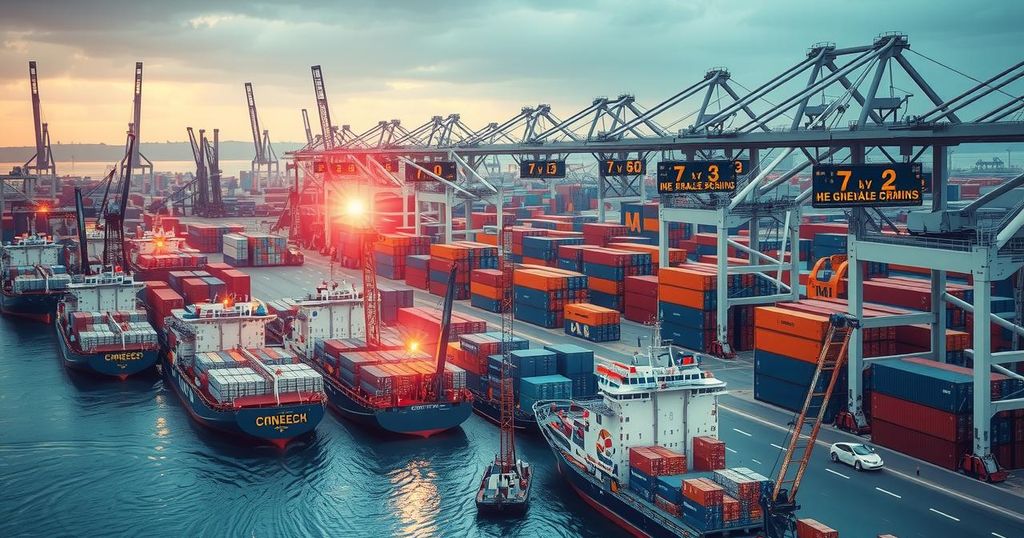President Trump’s tariffs on imports from Canada, Mexico, and China have provoked retaliatory actions from both Canada and Mexico, igniting a trade war. Import duties range from 10 to 25 percent, intended to combat illegal drug trafficking and reduce illegal immigration. This decision risks exacerbating inflation and harming consumer welfare, with economic analysis predicting significant income loss for U.S. households. Both Canada and Mexico are poised to protect their interests amid escalating tensions.
President Trump’s recent order to implement tariffs on imports from Canada, Mexico, and China has ignited a trade war among the United States and its North American allies. Trump justified these tariffs, claiming they are vital for safeguarding American interests, particularly in combating illegal drug manufacturing and trafficking. This decision has prompted immediate retaliatory measures from both Canada and Mexico, which not only expresses a sense of betrayal but also risks economic instability within the region.
The tariffs range from 10 percent on energy imports from Canada to 25 percent for other goods from both Canada and Mexico. Trump has highlighted the significance of reducing illegal immigration and drug trafficking as primary motivations behind these tariffs. Opponents have voiced concerns that these tariffs will exacerbate inflation, undermining Trump’s pledges to lower consumer prices on essential goods.
In response, Canadian Prime Minister Justin Trudeau announced that Canada will impose matching 25 percent tariffs on approximately $155 billion worth of U.S. imports. Trudeau’s statements underscore the longstanding alliance between the two nations, emphasizing shared sacrifices in times of crisis. Mexican President Claudia Sheinbaum has also ordered retaliatory tariffs, contesting U.S. allegations regarding Mexico’s government involvement with criminal organizations.
Both Canadian and Mexican leaders have expressed their determination to defend their economic interests, with Canada urging citizens to support local products over U.S. imports. China has voiced disapproval of the U.S. tariffs as a harmful action, signaling plans for countermeasures and potential legal action at the World Trade Organization. The looming tariffs have created a precarious situation, potentially damaging economic relations and harming consumer welfare in the U.S.
Economic analysts predict that the tariffs may significantly dampen U.S. economic growth, with households facing an average income drop of $1,170 due to increased prices. Democrats have quickly pointed fingers at Trump, arguing that his tariffs will contribute to rising prices on staples such as groceries and transportation. Trump’s administration, however, remains resolute in its stance, explaining that it’s critical to address the fentanyl crisis linked to drug imports.
Despite acknowledging the potential for increased inflation, Trump’s order lacks provisions for exceptions, impacting various industries that rely on imports. This move indicates a more aggressive approach to trade policy in the U.S., a continuation of Trump’s philosophy prioritizing national and economic security. Meanwhile, Trudeau has encouraged a reciprocal reliance on domestic goods to mitigate economic repercussions amid this trade escalation.
The potential for ongoing tariff increases reflects a broader strategy by Trump to reinforce his standing commitments on import taxes across various sectors of the economy, which could lead to prolonged tensions in international trade relations.
The recent imposition of tariffs by President Trump marks a significant escalation in U.S. trade policy, particularly with longstanding allies Canada and Mexico. The tariffs serve a dual purpose: addressing domestic concerns regarding illegal immigration and drug trafficking, specifically fentanyl, while also adhering to Trump’s economic agenda. This decision has sparked immediate retaliation from both neighboring countries, raising concerns over economic stability and the prospect of a comprehensive trade war.
In conclusion, the initiation of tariffs by President Trump has triggered swift retaliatory actions by Canada and Mexico, jeopardizing the intricate economic relations within North America. Both neighboring nations express feelings of betrayal and resolve to protect their economic interests in response to the imposed tariffs. The situation presents potential challenges for U.S. consumers and threatens the overall stability of the economic landscape, particularly as the phase of increased tariffs continues to unfold.
Original Source: www.pbs.org






